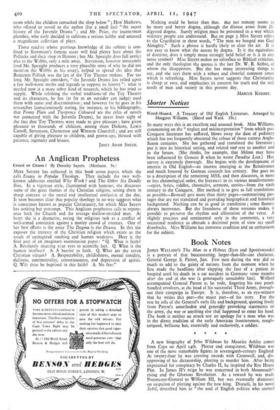Shorter Notkes
IN many ways this is an excellent and unusual book. Miss Williams, commenting on the "neglect and misinterpretation" from which pre- Conquest literature has suffered, blows away the dust of pedantry which has too frequently obscured the colour of those earnest Anglo- Saxon centuries. She has gathered and translated the literature ; put it into its historical setting, and related one text to another and to the future. (She thinks, for example, that Milton may have been influenced by Genesis B when he wrote Paradise Lost.) Her survey is extremely thorough. She begins with the development of interest in Old English—an interest emerging at the Renaissance and much fostered by German research last century. She goes on to a description of the remaining MSS, and then discusses, in more or less chronological order, the literature in its various manifestations —epics, lyrics, riddles, chronicles, sermons, stories—from the sixth century to the Conquest. Her method is to give as full translations as possible—Beowulf gets more than thirty pages—summarising pas- sages that are not translated and providing biographical and historical background. Nothing can be as good in translation ; some flatness always intervenes. But the literalness of these versions makes it possible to preserve the rhythm and alliteration of the verse. A slightly precious and sentimental style in the comments, a very occasional tendency to obtrude a doctrinal point of view are small drawbacks. Miss Williams has immense erudition and an enthusiasm for the subject.


































 Previous page
Previous page